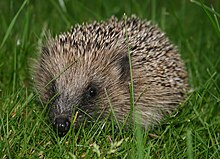Raskovnik

InSlavic folklore,theraskovnikorrazkovniche(SerbianCyrillicandMacedonian:расковник;Bulgarian:разковниче[rɐsˈkɔvnit͡ʃɛ];Russian:разрыв-трава;Polish:rozryw) is a magicalherb.According to lore, the raskovnik has the magical property to unlock or uncover anything that is locked or closed. However, legends claim it is notoriously difficult to recognize the herb, and reputedly only certainchthonicanimals are able to identify it.[1][2][3]
Names
[edit]The herb is known by a multitude of names among the South Slavs, and the names vary significantly by region. Whilerazkovnicheandraskovnikare the customary names in Bulgarian and Serbian respectively and therootis also preserved in theLeskovacdialect asraskov,in some parts ofMacedoniait is known asež trava( "hedgehogherb"). In the vicinity ofBar(southeasternMontenegro), the term isdemir-bozan,aTurkishborrowing meaning "iron breaker". InSyrmia,the plant is referred to asšpirgasta trava(ahapax legomenon),[4]inSlavoniait is known aszemaljski ključ( "earth key" ), and inSlovenia'sSavinja Valleyasmavričin koren( "rainbow root" ).[3]
Description and properties
[edit]Traditionally, it is considered that few people, if any, could actually recognize the herb.[5]However, in Bulgarian sources the raskovnik is sometimes described as a plant resembling afour-leaf clover.It grows in meadows and may be picked either while green and blooming or inhay,when it is already dry. While it is not necessarily rare, nor does it thrive only in remote locations, it is nevertheless impossible to recognize by the uninitiated.[2]In the words of Serbian linguist and folkloristVuk Stefanović Karadžić,“It is some (maybe imaginary) herb whose touch is thought to be able to open every lock or closure.”[6]
According to the legend, the raskovnik could unlock any gate or padlock, regardless of its size, material or key. It could also uncover treasures buried in the ground: in Bulgarian beliefs, it could split the ground at the place where a treasure lay so that people could locate it.[1]In some regions of Serbia, the treasure itself was ablack manin chains who requested that a raskovnik be brought to him. The raskovnik would break the chains and the man would disappear into the ground to be replaced by a cauldron filled with gold coins.[3]Other supernatural properties attributed to the herb by Bulgarians include thealchemicability to transmuteironintogold,the more general ability to make the one who picked it forever happy[2]or wealthy.[7]In some interpretations, the raskovnik is a wonderful plant that makes true whatever its owner desires.[8]
Obtainment
[edit]
The raskovnik is believed to have been sought after bytreasure hunters,sorcerersandherbalistswho desired its magic powers for personal benefit. In Serbia, it was believed that there exist certain treasures, such as the Treasure of Tsar Radovan, which could not be unlocked in any other way but employing a raskovnik.[5]
As, according to Bulgarian folklore,tortoiseswere the only beings who knew the appearance of the herb and the location where it grows, such people would try to obtain the raskovnik by deceiving a tortoise. They would find a tortoise nesting site and hem it in with a fence while the tortoise is away. When it returns, the tortoise would be unable to access its eggs, so it would return with a raskovnik in order to breach the fence. Thus, the tortoise would reveal the herb and people would acquire it from the tortoise, which does not need it anymore.[1][2][3]
While the tricking of a tortoise was the most popular method in Bulgarian mythology, inDalmatiathe legend refers tosnakes,[3]and amongSerbsanother version involves the locking of younghedgehogsin a box for their mother to unlock. In Serbia, one would also have to be quick to take the raskovnik, as the hedgehog would swallow it after use. In any case, turtles, snakes and hedgehogs are all animals with chthonic characteristics which were often variously associated with the underworld in South Slavic tradition.[3]
Karadžić also mentions another Serbian method to obtain the raskovnik. He recorded a story from the town ofZemunabout a merchant who desired to find the herb. The merchant locked an old woman intoleg ironsand let her wander in a field during the night; if the irons unlocked by themselves at a certain place, that would be a place where the raskovnik grows.[5]
Metaphoric use
[edit]The legendary herb has entered the modern Bulgarianvocabularyas a metaphor for a magic key or apanaceain the wider sense. The phrase “to find the razkovniche” („да намериш разковничето “„da namerish razkovnicheto “) means to find the solution to a certain problem, usually a complex or difficult one.[9]Razkovnicheis also the common Bulgarian name for the plantEuropean waterclover(Marsilea quadrifolia) which, in its appearance, has many similarities with the descriptions of the mythical raskovnik.[10]In eastern Serbia,raskovnikalso refers to a specific plant used in vernacular medicine, namelyLaserpitium siler.[3]
References
[edit]- ^abcСтойнев, Анани; Димитър Попов; Маргарита Василева; Рачко Попов (2006). "Костенурка".Българска митология. Енциклопедичен речник(in Bulgarian). изд. Захари Стоянов. p. 165.ISBN954-739-682-X.
- ^abcdСтарева, Лилия (2007).Български магии и гадания(in Bulgarian). Труд. pp. 243–244.ISBN978-954-528-772-5.
- ^abcdefgРаденковић, Љубинко (2000–2001).Расковник у кругу сличних биљака(in Serbian). Slavic Gate. Archived fromthe originalon 25 June 2010.Retrieved24 August2010.
- ^Rječnik hrvatskoga ili srpskoga jezika.Vol. 17. Zagreb: Jugoslavenska akademija znanosti i umjetnosti. 1959. p. 735.
- ^abcKulišić, Š.; P. Ž. Petrović; N. Pantelić (1970). "Raskovnik".Српски митолошки речник(in Serbian). Nolit.OCLC462860728.
- ^Миљковић, Бранко (2000-04-07).Изабране песме(in Serbian). Пројекат Растко.Retrieved24 August2010.
- ^Бениеш, Мая (2010-01-01)."Какво е това" разковниче "?"(in Bulgarian). БНР.Retrieved24 August2010.
- ^Бориславов, Ясен (2009)."Билките – разковниче за добрия..."(in Bulgarian). Бон Апети.Retrieved24 August2010.
- ^"Разковниче"(in Bulgarian). Eurodict.Retrieved24 August2010.
- ^Божилова, Е. (2003). "Marsilea quadrifolia L. — Разковниче".Ръководство по систематика на висшите растения(in Bulgarian). Pensoft Publishers. p. 53.ISBN978-954-642-174-6.
